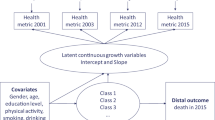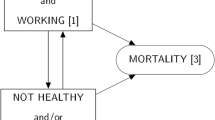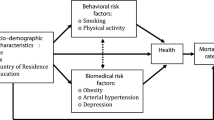Abstract
CROSS-SECTIONAL analysis, by means of which is investigated the behaviour of a cross-section of the population at a given point in time, is a convenient method in many fields of research where age or maturational differences are of interest. Implicit in the findings of such investigations are predictions about the future behaviour of the groups concerned. Such predictions are, however, based on the assumption that the behavioural differences between groups are due to the age differences involved, and that future age changes will bring about similar behavioural differences. The fallibility of such predictions in the field of demography has been pointed out1. This investigation is aimed at checking similar findings in the field of absence behaviour in an industrial situation.
This is a preview of subscription content, access via your institution
Access options
Subscribe to this journal
Receive 51 print issues and online access
$199.00 per year
only $3.90 per issue
Buy this article
- Purchase on Springer Link
- Instant access to full article PDF
Prices may be subject to local taxes which are calculated during checkout
Similar content being viewed by others
References
Medawar, P. B., The Future of Man (Methuen, London, 1960).
Buzzard, R. B., and Shaw, W. J., Brit. J. Indust. Med., 9, No. 4 (1952).
Behrend, H., Intern. Labour Rev., 79, No. 2 (1959).
Author information
Authors and Affiliations
Rights and permissions
About this article
Cite this article
DE LA MARE, G., SERGEAN, R. Validity of Prediction based on Cross-Sectional Analysis. Nature 192, 1318–1319 (1961). https://doi.org/10.1038/1921318b0
Issue Date:
DOI: https://doi.org/10.1038/1921318b0
Comments
By submitting a comment you agree to abide by our Terms and Community Guidelines. If you find something abusive or that does not comply with our terms or guidelines please flag it as inappropriate.



